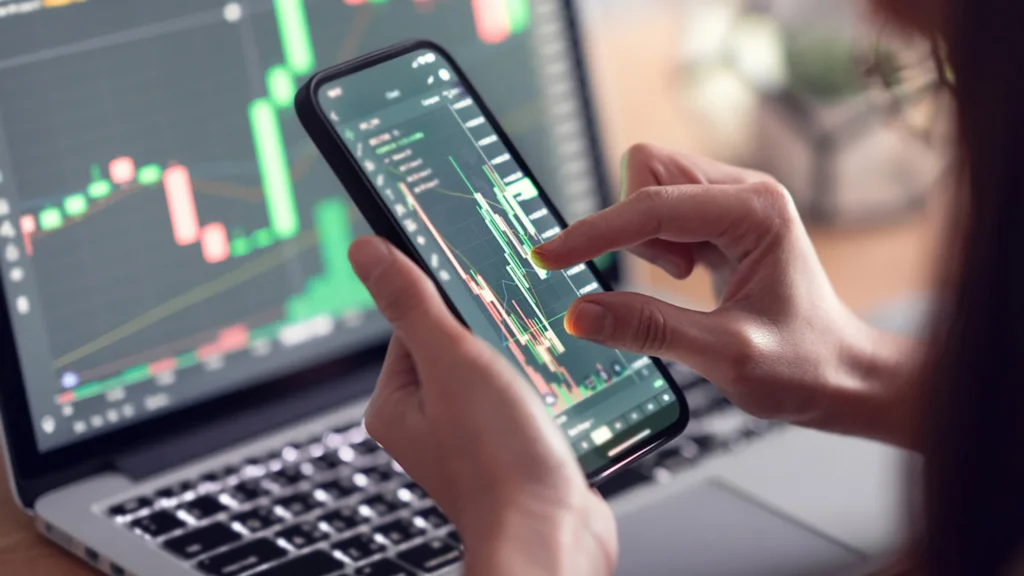
Think about this: It’s a crisp Saturday morning, and also you’re sipping espresso at your favourite café. Over the hum of chatter, you overhear two associates animatedly discussing their newest inventory picks—phrases like “dividends,” “bull markets,” and “portfolio” float by means of the air. You are feeling a pang of curiosity combined with somewhat FOMO (worry of lacking out). What are they speaking about? Might you be part of the dialog for those who needed to? If the inventory market appears like a mysterious membership you haven’t been invited to, don’t fear—this weblog put up is your all-access move. By the tip, you’ll not solely perceive the fundamentals but in addition really feel impressed to take your first steps towards monetary empowerment. Let’s dive in!
The inventory market is extra than simply numbers flashing on screens or fits shouting on buying and selling flooring—it’s a dwelling, respiration ecosystem the place wealth is created, misplaced, and redistributed every single day. Whether or not you’re an entire beginner dreaming of economic freedom or somebody who’s dabbled however needs a clearer image, this information will stroll you thru the necessities with tales, examples, and actionable ideas. Consider it as a pleasant chat with a educated pal who’s acquired your again.
What Is the Inventory Market, Actually?
At its core, the inventory market is a spot the place folks purchase and promote items of corporations—often known as shares or shares. Image it like an enormous on-line market, not in contrast to eBay, however as an alternative of bidding on classic information or handmade crafts, you’re shopping for a tiny sliver of companies like Apple, Tesla, and even your favourite espresso chain. If you personal a inventory, you’re a part-owner of that firm, entitled to a slice of its earnings (if it makes any) and a say in the way it’s run.
Traditionally, inventory markets started as bodily areas—just like the New York Inventory Trade (NYSE), based in 1792 below a buttonwood tree on Wall Avenue—the place merchants swapped paper certificates. At this time, it’s principally digital, with trades occurring in milliseconds by way of platforms like Robinhood or Constancy. However the essence stays: it’s a system connecting individuals who wish to make investments cash with corporations that want it to develop.
Right here’s a private tidbit: My first encounter with the inventory market got here at age 15, when my uncle gifted me a single share of Coca-Cola for my birthday. I didn’t get it then—why give me paper as an alternative of money?—however years later, that share paid me a small dividend, and the sunshine bulb clicked. The inventory market isn’t nearly buying and selling; it’s about constructing wealth over time.
Why Does the Inventory Market Matter to You?
You may marvel, “Why ought to I care about this?” Past the headlines about billionaires and crashes, the inventory market impacts your life greater than you assume. It’s tied to retirement accounts like 401(ok)s, influences job creation when corporations develop, and even impacts the value of your morning latte if inflation spikes. Investing in shares might be your ticket to beating inflation—traditionally, shares have returned about 10% yearly earlier than inflation, far outpacing the measly 0.1% you’d get from a financial savings account right now.
Take Sarah, a fictional 30-year-old instructor I’ll invent for this story. She began investing $100 a month in a low-cost inventory fund 5 years in the past. Due to compound curiosity—the place your earnings generate extra earnings—her $6,000 funding is now price over $8,000, regardless of ups and downs. That’s the magic of the market: it rewards persistence and consistency.
How Does the Inventory Market Work?
Let’s break it down with a easy analogy. Think about you’re at a farmer’s market. A vendor—let’s name him Farmer Joe—wants cash to purchase extra seeds and develop his apple orchard. He sells “shares” of his enterprise to you and different patrons for $10 every. If his apples promote like hotcakes, his enterprise grows, and your share could be price $15 later. But when a storm wipes out his crop, that share might drop to $5. The inventory market is comparable, simply on an enormous scale with hundreds of thousands of “Farmer Joes.”
Right here’s the mechanics in a nutshell:
- Corporations Go Public: When a enterprise needs to lift money, it holds an Preliminary Public Providing (IPO), promoting shares to the general public. Consider Airbnb’s 2020 IPO, which raised billions.
- Buying and selling Occurs: Buyers purchase and promote these shares on exchanges just like the NYSE or Nasdaq. Costs fluctuate based mostly on provide and demand—extra patrons than sellers push costs up, and vice versa.
- You Take part: By means of a brokerage account, you should purchase shares, maintain them, or promote them, aiming to revenue from value will increase or dividends.
It’s not all rosy, although. Markets might be emotional rollercoasters—consider the 2008 monetary disaster—however over time, they have an inclination to climb, reflecting human innovation and progress.
Key Gamers within the Inventory Market
The inventory market isn’t a solo act; it’s a workforce effort. Right here’s who’s on the sphere:
- Buyers: That’s you and me, from small-timers to billionaires like Warren Buffett.
- Corporations: The companies issuing shares, from giants like Amazon to startups.
- Brokers: Middlemen (or apps) like Charles Schwab that execute your trades.
- Regulators: Teams just like the SEC (Securities and Trade Fee) guarantee truthful play.
- Market Makers: Companies that preserve trades flowing easily by shopping for and promoting when others gained’t.
Every participant shapes the market’s rhythm, creating alternatives and dangers you’ll navigate as an investor.
Forms of Shares: What’s on the Menu?
Not all shares are created equal. Consider them like ice cream flavors—every has its vibe:
- Progress Shares: Excessive-flying corporations like Tesla that reinvest earnings to develop. They’re thrilling however risky.
- Worth Shares: Undervalued gems, like a reduced Ford, providing regular potential at a discount.
- Dividend Shares: Dependable payers like Johnson & Johnson, sharing earnings frequently—good for revenue seekers.
- Blue-Chip Shares: Established titans like Microsoft with a monitor file of stability.
Selecting the right combination relies on your objectives—progress for the younger risk-taker, dividends for the retiree. My first inventory, Coca-Cola, was a blue-chip dividend payer, instructing me the enjoyment of mailbox cash.
Comparability Desk: Inventory Varieties at a Look
| Inventory Sort | Threat Stage | Reward Potential | Greatest For | Instance |
|---|---|---|---|---|
| Progress Shares | Excessive | Excessive | Aggressive Buyers | Tesla |
| Worth Shares | Medium | Average | Cut price Hunters | Ford |
| Dividend Shares | Low-Medium | Regular Revenue | Revenue Seekers | Johnson & Johnson |
| Blue-Chip Shares | Low | Constant Progress | Conservative Buyers | Microsoft |
This desk simplifies your choices—use it as a cheat sheet when constructing your portfolio!
Bulls, Bears, and Market Traits
Ever heard “it’s a bull market” or “bear market”? These aren’t simply animal metaphors—they describe the market’s temper:
- Bull Market: Costs are rising, optimism reigns—just like the post-2009 restoration, the place the S&P 500 soared.
- Bear Market: Costs fall 20% or extra, worry takes over—assume 2020’s COVID crash.
Traits matter, however don’t panic-sell in a bear market or overbuy in a bull one. My pal Mike discovered this the laborious approach, promoting in the course of the 2020 dip solely to observe shares rebound weeks later. Timing the market is a idiot’s recreation; time in the market is what counts.
Begin Investing: Your First Steps
Able to dip your toes in? Right here’s your newbie’s playbook:
- Set Targets: Are you saving for a home, retirement, or simply additional money? Targets information your technique.
- Open a Brokerage Account: Platforms like E*TRADE or Vanguard make it straightforward—many don’t have any minimums.
- Begin Small: Purchase a single share or a fractional one (thanks, Robinhood) to be taught the ropes.
- Diversify: Don’t put all of your eggs in a single basket—unfold bets throughout industries.
- Suppose Lengthy-Time period: The market’s a marathon, not a dash.
After I began, I invested $50 in an ETF (Trade-Traded Fund)—a basket of shares—as a result of I couldn’t choose winners. It grew 20% in a 12 months, proving easy might be good.
Dangers and Rewards: The Double-Edged Sword
Investing isn’t a get-rich-quick scheme—it’s a calculated gamble. Rewards might be life-changing: A $10,000 funding in Netflix in 2005 can be price over $500,000 right now. However dangers loom—corporations fail, markets crash, and feelings derail choices. The dot-com bubble of 2000 worn out trillions as hyped tech shares tanked.
Mitigate dangers with:
- Analysis: Use instruments like Yahoo Finance to review corporations.
- Persistence: Experience out dips as an alternative of panic-selling.
- Diversification: Combine shares, bonds, and money to cushion blows.
Skilled Insights: What the Execs Say
Legends like Warren Buffett preach simplicity: “Purchase great companies at truthful costs and maintain them endlessly.” In the meantime, Cathie Wooden of ARK Make investments bets massive on innovation, like AI and biotech. Each agree on one factor—know what you personal. Buffett’s Berkshire Hathaway holds Coca-Cola for many years, whereas Wooden’s funds chase tomorrow’s stars. Mix their knowledge: anchor with stalwarts, spice with progress.
Instruments and Sources for Newbies
You’re not alone on this journey. Arm your self with:
- Apps: Webull totally free trades, Morningstar for evaluation.
- Books: The Clever Investor by Benjamin Graham—Buffett’s bible.
- Communities: Reddit’s r/investing for actual discuss.
I lean on Finviz for inventory screening—it’s like a treasure map for locating undervalued gems.
FAQ: Your Inventory Market Questions Answered
Q: Can I lose all my cash within the inventory market?
A: Sure, for those who spend money on one firm that goes bust—like Enron in 2001—however diversification reduces that threat to near-zero with broad funds.
Q: How a lot cash do I would like to start out?
A: As little as $1! Fractional shares on apps like Robinhood allow you to personal a bit of expensive shares like Google.
Q: What’s the distinction between shares and bonds?
A: Shares are possession; bonds are loans you give corporations or governments, repaid with curiosity. Shares provide greater returns however extra threat—be taught extra right here.
Q: Ought to I rent a monetary advisor?
A: When you’re overwhelmed, sure—discover a fee-only one by way of NAPFA. However DIY works with low-cost index funds.
Q: How do I do know when to promote?
A: Robust name! Promote in case your objectives change, the corporate falters, otherwise you’ve hit your revenue goal—not simply because the market dips.
Conclusion: Your Inventory Market Journey Awaits
As we wrap up this 3,000-word journey, let’s replicate. The inventory market isn’t a on line casino—it’s a instrument for constructing wealth, brick by brick, over years. From my teenage Coca-Cola share to Sarah’s rising fund, the tales present it’s much less about genius and extra about beginning, studying, and sticking with it. You’ve acquired the fundamentals now: what shares are, how markets work, and the way to leap in with out drowning. It’s not about timing the right entry—it’s about exhibiting up, investing in what you imagine in, and letting time do the heavy lifting.
What’s the next move? Possibly open that brokerage account this weekend or seize a espresso and examine an organization you’re keen on. The market’s doorways are huge open, and your seat’s ready. It gained’t all the time be clean—bulls flip to bears, and headlines will scream doom—however historical past proves the development is up. You’re not simply investing in shares; you’re investing in your self, your future, and the world’s potential. So, take a deep breath, choose your first inventory (or fund), and be part of the dialog. Who is aware of? A 12 months from now, you could be the one sparking envy on the café. Let’s make it occur—your monetary story begins right now!


